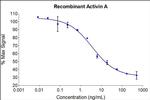Search Thermo Fisher Scientific
FIGURE: 1 / 1
Human Activin A Protein (PHC9564) in Functional

Product Details
PHC9564
Species
Published species
Expression System
Molecular weight
Class
Type
Purity
Endotoxin concentration
Activity
Conjugate
Form
Purification
Storage buffer
Contains
Storage conditions
Shipping conditions
Product Specific Information
Carrier-Free
Reconstitution: We recommend that this vial be briefly centrifuged prior to opening to bring the contents to the bottom. Reconstitute lyophilized recombinant human Activin A in sterile PBS containing 0.1% human serum albumin. Further dilutions should be made in low endotoxin medium or a buffered solution containing a carrier protein such as heat inactivated FCS or tissue culture grade BSA.
Storage: Store this lyophilized preparation at ≤ -20°C, preferably desiccated. Upon reconstitution, apportion into working aliquots and store at ≤ -20°C. Avoid repeated freeze/thaw cycles.
Target Information
Activins are dimeric growth and differentiation factors which belong to the transforming growth factor-beta (TGF-beta) superfamily of structurally related signaling proteins. Activins signal through a heteromeric complex of receptor serine kinases which include at least two type I ( I and IB) and two type II (II and IIB) receptors. These receptors are all transmembrane proteins, composed of a ligand-binding extracellular domain with cysteine-rich region, a transmembrane domain, and a cytoplasmic domain with predicted serine/threonine specificity. Type I receptors are essential for signaling; and type II receptors are required for binding ligands and for expression of type I receptors. Type I and II receptors form a stable complex after ligand binding, resulting in phosphorylation of type I receptors by type II receptors. Activin A mutations are associated with fibrodysplasia ossificans progressive.
For Research Use Only. Not for use in diagnostic procedures. Not for resale without express authorization.
Bioinformatics
Protein Aliases: Activin beta-A chain; EDF; erythroid differentiation factor; Erythroid differentiation protein; follicle-stimulating hormone-releasing protein; FSH-releasing protein; Inhibin beta A chain; inhibin, beta A (activin A, activin AB alpha polypeptide); Inhibin, beta-1
Gene Aliases: EDF; FRP; INHBA
UniProt ID: (Human) P08476, (Mouse) Q04998
Entrez Gene ID: (Human) 3624, (Mouse) 16323

We're here to help
Get expert recommendations for common problems or connect directly with an on staff expert for technical assistance related to applications, equipment and general product use.
Contact tech support
